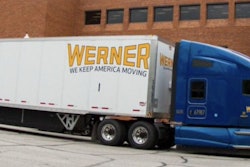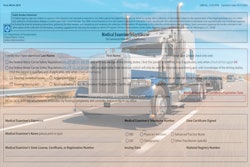Trucking news and briefs for Tuesday, July 1, 2025:
Stay alert for cargo theft through the weekend
The July 4 holiday period has arrived, and cargo theft prevention and recovery companies are issuing warnings to the trucking industry to be on high alert over the next week.
The holiday period is considered to be July 1-7, as shippers and receivers may have different operating hours than normal during that period.
According to Verisk CargoNet, “extended business closures generally create advantageous operating conditions for cargo thieves, making this period particularly vulnerable for supply chain security.”
 Over the last five years between July 1-7, Verisk CargoNet has recorded 184 cargo theft incidents worth more than $7.5 million.Verisk CargoNet
Over the last five years between July 1-7, Verisk CargoNet has recorded 184 cargo theft incidents worth more than $7.5 million.Verisk CargoNet
The Overhaul firm added that because the holiday falls on a Friday this year, “it’s essential to confirm hours of operation at all receiving facilities before dispatching loads.”
CargoNet has observed 184 cargo thefts over the last five years between July 1-7. The firm said July 1 and July 3 have been the highest-risk days during that five-year period, “with theft activity generally concentrated around extended weekend closures.”
Overhaul added that distribution centers and warehouses often operate with reduced staffing or are closed entirely around the holiday.

[Related: Rival Armenian crime syndicates busted in L.A.: DOJ]
Beyond just the holiday period, CargoNet has also observed an increase in daily theft activity from an average of four thefts reports per day between 2013 and 2022, which increased to eight reports daily in 2022, 10 in 2024 and 11 so far in 2025.
The firm noted that California, Texas and Illinois remain the most targeted states, with shipments of non-alcoholic beverages, vehicle accessories (tires and automotive parts), computer electronics and major appliances being the most targeted items. Scott Cornell, vice president of transportation with Travelers, noted that metals, particularly copper, are a hot commodity among cargo thieves this year.
"The July 4th holiday period consistently presents one of the highest-risk windows for cargo theft due to extended facility closures and reduced security presence," said Keith Lewis, Vice President of Operations at Verisk CargoNet. "With theft rates nearly tripling over the past decade, logistics companies must prioritize enhanced security measures during holiday periods to protect their assets and maintain supply chain integrity."
CargoNet recommends that both security managers and drivers have accurate license plate, VIN, and descriptive information for tractors, trailers, containers, and container chassis to present to law enforcement in the event of a theft. Further, trailers should have high-security barrier seals in addition to hardened padlocks. Tractors should be secured with high-security locking devices, such as air-cuff and steering column locks. More tips can be found here.
Overhaul recommends that any stops made over the holiday period should be in well lit, secured areas with trailer doors backed to a solid surface, if possible.
[Related: California cargo thief's 'No Name Given' CDL, explained]
NYC begins auto-enforcing fines on overweight trucks heading to Staten Island
New York City has expanded its enforcement on overweight trucks on the Brooklyn Queens Expressway (BQE) and is now issuing violations to overweight Staten Island-bound trucks as of June 22.
The New York City Department of Transportation’s use of weigh-in-motion (WIM) technology uses roadway weight sensors to issue $650 violations to overweight trucks. The program's goal is to limit the wear and tear on the expressway's cantilever spans, the department said.
In March, a 90-day warning period began, and those operating overweight vehicles have received notices that they are in violation of state law and that automated enforcement will begin on June 22. Within the first 75 days of the warning period, more than 3,000 warnings were issued to overweight vehicles. During the first year of WIM enforcement for Queens-bound traffic, the number of overweight vehicles dropped by 60%, NYC DOT said.
"Overweight trucks cause wear-and-tear on our roadways and we all pay the price through expensive repairs to our infrastructure," said NYC DOT Commissioner Ydanis Rodriguez. "That is why we are expanding our role as a nationwide leader by cracking down on overweight vehicles on the BQE, now deploying state-of-the-art roadway weight sensors for Staten Island-bound traffic."
NYC DOT announced in May that it would be expanding its use of WIM sensors by adding 14 new locations across New York state, including nine city-owned bridges and highways managed by NYC DOT.
[Related: New York to expand use of weigh-in-motion tech for trucking-company fines]
Fireworks haulers get July 4 HOS exemption extended
The Federal Motor Carrier Safety Administration has renewed an exemption that allows certain fireworks-hauling drivers to exclude off-duty and sleeper-berth time of any length from the calculation of the 14-hour limit and to use paper logs in lieu of electronic logging devices during the July 4 holiday period.
The exemption was renewed for the American Pyrotechnics Association and its 44 member companies. APA member companies have held waivers or exemptions during Independence Day periods each year since 2005. The most recent waiver expired on July 8, 2024.
The exemption applies to drivers transporting fireworks displays between June 28 and July 8.
APA has said compliance with the 14-hour rule is “extraordinarily challenging” for members of the fireworks industry during the Independence Day period. Most fireworks display shows are transported by pyrotechnicians with hazardous material safety permits in small rented or leased commercial motor vehicles, which do not have sleeper berths. The pyrotechnician drives the display equipment and fireworks to the site, supervises the crew in setting up the display, waits for the display time, fires the display, and returns the equipment and remaining fireworks to a licensed storage facility.
FMCSA said it conducted a comprehensive review of the safety performance history on each of the motor carriers covered by the exemption and found the carriers have “satisfactory” safety ratings issued by FMCSA and valid Hazardous Materials Safety Permits. In addition, the Pipeline and Hazardous Materials Safety Administration reviewed its investigative records and found no adverse data.
The new exemption is valid through July 8, 2029.









